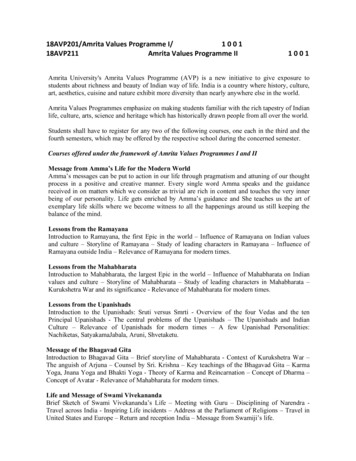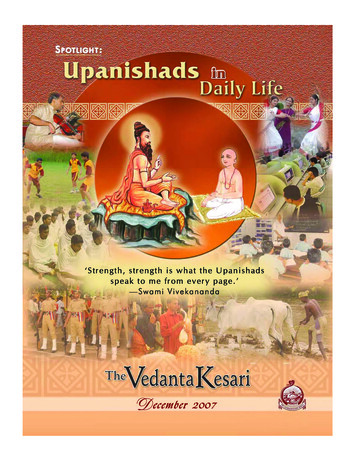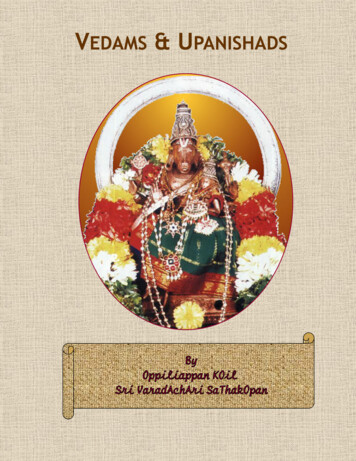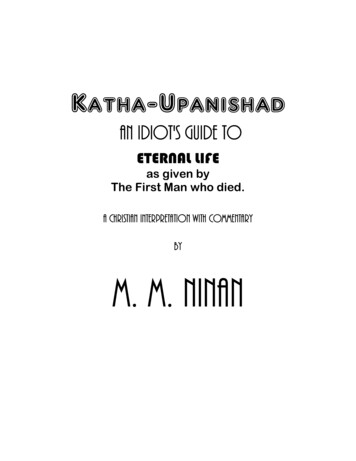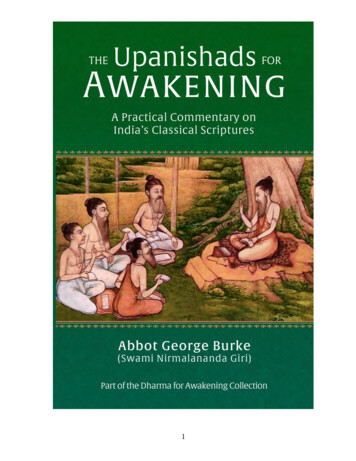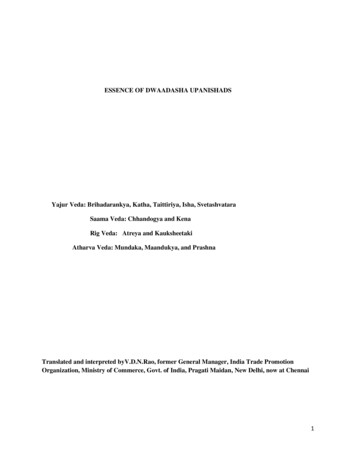
Transcription
The Ten Principal Upanishads
THETENPRINCIPAL UPANISHADSPut into English byShree P u r o h i t S w a m iandW.B.YeatsFABER A N D FABER L I M I T E D24 Russell SquareLondon
First published in April Mcmxxxviiby Faber and Faber Limited24 Russell Square London W.C. 1Second edition March McmxxxviiiReprinted McmliiPrinted in Great Britain byBradford and Dickens London W.C. 16 All rights reserved
PrefaceI n c o m p e t e n t to expound I n d i a n philosophy, I shallillustrate some few t h i n g s t h a t have to be said f r o mm y o w n daily thoughts and contemporary poetry.Shree P u r o h i t S w a m i has asked me to introducew h a t is twice as m u c h his as m i n e , for he knows Sans k r i t and E n g l i s h , I b u t E n g l i s h . Before, after and d u r i n g his n i n e years' p i l g r i m a g e r o u n d I n d i a he has sungi n Sanskrit every m o r n i n g t h e Awadhoota Geeta, att r i b u t e d to Dattatreya, an ancient Sage to w h o m hepays particular devotion, and t w o Upanishads, t h e Sadg u r u , his o w n composition, and t h e M a n d o o k y a ; andperhaps at n i g h t to e n t e r t a i n or edify his hosts, songs ofhis o w n composition ; those i n M a r a t h i o r H i n d i a m o n gthe unlearned, those in Sanskrit a m o n g the learned.Sanskrit has been a f a m i l i a r speech, not c h a n g i n g f r o mplace to place, b u t always on his tongue.For some f o r t y years my f r i e n d George Russell ( A . E . )has quoted me passages f r o m some Upanishad, and forthose f o r t y years I have said to myself—some day I w i l lf i n d out i f h e knows w h a t h e i s t a l k i n g about. Betweenus existed f r o m t h e b e g i n n i n g t h e antagonism t h a tunites dear friends. M o r e t h a n once I asked h i m t h ename of some translator a n d even b o u g h t t h e book, b u tt h e most e m i n e n t scholars l e f t me incredulous. C o u l d7
latinised words, hyphenated words ; could polyglotphrases, sedentary distortions of unnatural English:—'However many Gods in Thee, All-Knower, adverselyslay desires of a person'—could muddles, muddiedby 'Lo! Verily' and 'Forsooth', represent what grassfarmers sang thousands of years ago, what their descendants sing today? So when I met Shree PurohitSwami I proposed that we should go to India andmake a translation that would read as though theoriginal had been written in common English: 'Towrite well,' said Aristotle, 'express yourself like thecommon people, but think like a wise man', a favourite quotation of Lady Gregory's—I quote her diaryfrom memory. Then when lack of health and moneymade India impossible we chose Majorca to escape telephones and foul weather, and there the work was done,not, as I had planned, in ease and leisure, but in the i n terstices left me by a long illness. Yet I am satisfied; Ihave escaped that polyglot, hyphenated, latinised,muddied muddle of distortion that froze belief. Can webelieve or disbelieve u n t i l we have put our thoughtinto a language wherein we are accustomed to expresslove and hate and all the shades between? When beliefcomes we stand up, walk up and down, laugh or swingan arm; a mathematician gets drunk ; finding thatwhich is the prerogative of men of action.I have not worked to confound George Russell,though often saddened by the thought that I could not—he died some months ago—but to confound some8
thing in myself. He expressed in his ceaseless vaguepreoccupation w i t h the East a need and curiosity of ourtime,' Psychical research, which must some day deeplyconcern religious philosophy, for its evidences surroundthe pilgrim and the devotee though they never takethe centre of the stage, has already proved the existence of faculties that would, combined into one man,make of that man a miracle-working Yogi. Moreand more too does it seem to approach a main thoughtof the Upanishads. Continental investigators, who rejectthe spiritism of Lodge and Crookes, but accept theirphenomena, postulate an individual self possessed ofsuch power and knowledge that they seem at everymoment about to identify it w i t h that Self withoutlimitation and sorrow, containing and contained by all,and to seek there not only the l i v i n g but the dead.But our need and curiosity have no one source. Between 1922 and 1925 English literature, wherever mostintense, cast off its preoccupation w i t h social problemsand began to create myths like those of antiquity, andto ask the most profound questions. I recall poems byT. S. Eliot, Those Barren Leaves' by Aldous Huxley,where there is a Buddhistic hatred of life, or a hatredSchopenhauer did not so much find in as deducedfrom a L a t i n translation of a Persian translation ofthe Upanishads: certain poems—The Seven Days ofthe Sun', 'Matrix', T h e Mutations of the Phoenix',by W. J. Turner, by Dorothy Wellesley, by HerbertRead, which have displayed in myths, not as might9
some writer of my youth for the sake of romantic suggestion but urged by the most recent thought, the worldemerging from the human mind. A still younger generation has brought a more minute psychological curiosity, suggesting an eye where a goldsmith's magnifying glass is screwed, to like preoccupations.In their pursuit of meaning, Day Lewis, MacNeice,Auden, Laura Riding have thrown off too much, as Ithink, the old metaphors, the sensuous tradition of thepoets:' H i g h on some mountain shelfHuddle the pitiless abstractions bald about the neck;'but have found, perhaps the more easily for that sacrifice, a neighbourhood where some new Upanishad,some half-asiatic masterpiece, may start up amid ouraverted eyes.W h e n I was young we talked much of tradition, andthose emotional young men, Francis Thompson, LionelJohnson, John Gray, found it in Christianity. But nowthat The Golden Bough has made Christianity lookmodern and fragmentary we study Confucius w i t hEzra Pound, or like T. S. Eliot find in Christianity aconvenient symbolism for some older or newer thought,or say w i t h Henry Airbubble, 'I am a member of theChurch of England but not a Christian.' Shree PurohitSwami and I offer to some young man seeking, likeShakespeare, Dante, M i l t o n , vast sentiments and generalisations, the oldest philosophical compositions of theworld, compositions, not writings, for they were sung10
long before they were written down. European scholarship w i t h many doubts has fixed their date, or the dateof the most important, as a little before 600 B.c. whenBuddha was born, but Indian scholarship prefers a farearlier date. Whatever the date, those forest Sages began everything; no fundamental problem of philosophy,nothing that has disturbed the schools to controversy,escaped their notice.It pleases me to fancy that when we t u r n towards theEast, in or out of church, we are turning not less to theancient west and north; the one fragment of paganIrish philosophy come down, 'the Song of Amergin',seems Asiatic; that a system of thought like that ofthese books, though perhaps less perfectly organised,once overspread the world, as ours today; 1 that ourgenuflections discover in that East something ancestralin ourselves, something we must bring into the lightbefore we can appease a religious instinct that for thefirst time in our civilisation demands the satisfaction ofthe whole man.Upanishad is doctrine or wisdom (literally 'At the feetof', meaning thereby ' A t the feet of some Master'), thedoctrine or wisdom of the Wedas. Each is attached tosome section and sometimes is named from the section.The Katha-Upanishad for instance is part of the Kathak1All Indian clerks in Government offices have just been ordered to wear trousers, so at any rate declares a London merchant, an exporter to India, who has decided to specialise introuser-stretchers. It follows the flag.11
Brahman section in the Yajur-Weda. Shree PurohitSwami has omitted the usual first five chapters of theChhand6gya-Upanishad because they are so intermixedw i t h ritual that they are no longer studied, though stillsung. For the same reason he has selected from Brihadaranyaka-Upanishad such passages as contain no suchintermixture. A few passages have been 'omitted, notbecause descriptions of ritual but because repetitionsof what is said and said as well elsewhere. Their orderwherein the Upanishads should be studied, according totradition, is that in which they are printed in this book.W.12B.YEATS.
ContentsI . T h e Lord15(Eesha-Upanishad)I I . At Whose Command?19(Kena-Upanishad)I I I . F r o m the Kathak Branch of theWedas 25(Katha-Upanishad)I V . Questions39(Prashna-Upanishad)V . At the Feet of the M o n k49(Mundaka-Upanishad)V I . At the Feet of Master Mandooka59(Mandookya-Upanishad)V I I . F r o m the Taittireeya Branch of the63Wedas VIII.(Aitareya-Upanishad)85I X . T h e Doctrine of the Chhandogyas(Chhandogya-Upanishad)119X . Famous Debates in the Forest(Brihadaranyaka-Upanishad)13
IThe Lord(Eesha-Upanishad)That is perfect. This is perfect. Perfect comes fromperfect. Take perfect from perfect, the remainder isperfect.M a y peace and peace and peace be everywhere.Whatever lives is f u l l of the Lord. Claim nothing;enjoy, do not covet His property.T h e n hope for a hundred years of life doing yourduty. No other way can prevent deeds from clinging,proud as you are of your human life.They that deny the Self, return after death to a godless b i r t h , blind, enveloped in darkness.The Self is one. Unmoving, it moves faster than themind. The senses lag, but Self runs ahead. Unmoving,it outruns pursuit. Out of Self comes the breath that isthe life of all things.Unmoving, it moves; is far away, yet near; w i t h i nall, outside all.Of a certainty the man who can see all creatures inhimself, himself in all creatures, knows no sorrow.15
How can a wise man, knowing the unity of life, seeing all creatures in himself, be deluded or sorrowful?The Self is everywhere, without a body, without ashape, whole, pure, wise, all knowing, far shining, selfdepending, all transcending} in the eternal processionassigning to every period its proper duty.Pin your faith to natural knowledge, stumblethrough the darkness of the blind; pin your faith tosupernatural knowledge, stumble through a darknessdeeper still.Natural knowledge brings one result, supernaturalknowledge another. We have heard it from the wisewho have clearly explained it.They that know and can distinguish between naturalknowledge and supernatural knowledge shall, by thefirst, cross the perishable in safety; shall, passing beyondthe second, attain immortal life.Pin your faith to the seed of nature, stumble throughthe darkness of the blind; pin your faith to the shapes ofnature, stumble through a darkness deeper still.The seed of nature brings one result; the shapes ofnature another. We have heard it from the wise, whohave clearly explained i t .They that know and can distinguish between theshapes of nature and the seed of nature shall, by the first,cross the perishable in safety; shall, passing beyond thesecond, attain immortal life.They have put a golden stopper into the neck of16
the bottle. Pull it, Lord! Let out reality. I am full oflonging.Protector, Seer, controller of all, fountain of life, upholder, do not waste light; gather light; let me see thatblessed body—'-Lord of all. I myself am He.Life merge into the all prevalent, the eternal; bodyturn to ashes. Mind! meditate on the eternal Spirit; remember past deeds. Mind! remember past deeds; remember, Mind! remember.Holy light! illuminate the way that we may gatherthe good we planted. Are not our deeds known to you?Do not let us grow crooked, we that kneel and prayagain and again.17
nAt Whose Command ?(Kena-Upanishad)1Speech, eyes, ears, limbs, life, energy, come to myhelp. These books have Spirit for theme. I shall neverdeny Spirit, nor Spirit deny me. L e t me be in union,communion w i t h Spirit. W h e n I am one w i t h Spirit,may the laws these books proclaim live in me, may thelaws live.T h e enquirer asked: ' W h a t has called my m i n d tothe hunt? W h a t has made my life begin? W h a t wags inmy tongue? W h a t God has opened eye and ear?'T h e teacher answered: ' I t lives in all that lives,hearing through the ear, thinking through the m i n d ,speaking through the tongue, seeing through the eye.T h e wise m a n clings neither to this nor that, rises outof sense, attains i m m o r t a l life.'Eye, tongue, cannot approach it nor m i n d know;not knowing, we cannot satisfy enquiry. It lies beyondthe known, beyond the unknown. We know throughthose who have preached it, have learnt it from tradition.19
T h a t which makes the tongue speak, but needs notongue to explain, that alone is Spirit; not what sets theworld by the ears.'That which makes the mind think, but needs nomind to think, that alone is Spirit; not what sets theworld by the ears.'That which makes the eye see, but needs no eye tosee, that alone is Spirit; not what sets the world by theears.'That which makes the ear hear, but needs no ear tohear, that alone is Spirit; not what sets the world bythe ears.'That which makes life live, but; needs no life to live,that alone is Spirit; not what sets the world by the ears.'2' I f you think that you know much, you know little.If you think that you know It from study of your ownmind or of nature, study again.'The enquirer said: 'I do not think that I know much,I neither say that I know, nor say that I do not.'The teacher answered: 'The man who claims that heknows, knows nothing; but he who claims nothing,knows.'Who says that Spirit is not known, knows; who claimsthat he knows, knows nothing. The ignorant think thatSpirit lies within knowledge, the wise man knows Itbeyond knowledge.'Spirit is known through revelation. It leads to free20
dom. It leads to power. Revelation is the conquest ofdeath.'The living' man who finds Spirit, finds Truth. But ifhe fail, he sinks among fouler shapes. The man whocan see the same Spirit in every creature, clings neitherto this nor that, attains immortal life.'3Once upon a time, Spirit planned that the gods mightwin a great victory. The gods grew boastful ; thoughSpirit had planned their victory, they thought they haddone it all.Spirit saw their vanity and appeared. They could notunderstand; they said: 'Who is that mysterious Person?'They said to Fire: 'Fire! Find out who is that mysterious Person.'Fire ran to Spirit. Spirit asked what it was. Fire said:'I am Fire; known to all.'Spirit asked: 'What can you do?' Fire said: T canburn anything and everything in this world.''Burn it,' said Spirit, putting a straw on the ground.Fire threw itself upon the straw, but could not burn it.Then Fire ran to the gods in a hurry and confessed itcould not find out who was that mysterious Person.Then the gods asked Wind to find out who was thatmysterious Person.Wind ran to Spirit and Spirit asked what it was. Windsaid: 'I am Wind j I am the King of the Air,'21
Spirit asked: 'What can you do?' and Wind said: 'Ican blow away anything and everything in this world.''Blow it away,' said Spirit, putting a straw on theground. Wind threw itself upon the straw, but couldnot move it. Then Wind ran to the gods in a hurry andconfessed it could not find out who was that mysteriousPerson.Then the gods went to Light and asked it to findout who was that mysterious Person. Light ran towardsSpirit, but Spirit disappeared upon the instant.There appeared in the sky that pretty girl, the Goddess of Wisdom, snowy Himalaya's daughter. Lightwent to her and asked who was that mysterious Person.4The Goddess said: 'Spirit, through Spirit you attained your greatness. Praise the greatness of Spirit.'Then Light knew that the mysterious Person was nonebut Spirit.That is how these gods—Fire, Wind and Light—attained supremacy ; they came nearest to Spirit andwere the first to call that Person Spirit.Light stands above Fire and Wind; because closerthan they, it was the first to call that Person Spirit.This is the moral of the tale. In the lightning, in thelight of an eye, the light belongs to Spirit.The power of the mind when it remembers and desires, when it thinks again and again, belongs to Spirit.Therefore let Mind meditate on Spirit.22
Spirit is the Good in all. It should be worshipped asthe Good. He that knows it as the Good is esteemed byall.Y o u asked me about spiritual knowledge, I have explained i t .Austerity, self-control, meditation are the foundation of this knowledge; the Wedas are its house, t r u t hits shrine.He who knows this shall prevail against all evil, enjoythe Kingdom of Heaven, yes, for ever enjoy the blessedKingdom of Heaven.23
IllFrom the Kathak Branch ofthe Wedas(Katha-Upanishad)Book I1May He protect us both. May He take pleasure in usboth. May we show courage together. May spiritualknowledge shine before us. May we never hate one another. May peace and peace and peace be everywhere.Wajashrawas, wanting heaven, gave away all hisproperty.He had a son by name Nachiketas. While the giftswere passing, Nachiketas, though but a boy, thought tohimself:'He has not earned much of a heaven; his cows canneither eat, drink, calve nor give m i l k . 'He went to his father and said: 'Father, have yougiven me to somebody?' He repeated the question asecond and a t h i r d time; at last his father said: 'I giveyou to Death.'Nachiketas thought: 'Whether I die now or later25
matters little ; but what I would like to know is whathappens if Death gets me now.'Wajashrawas would have taken back his words butNachiketas said: ' T h i n k of those who went before,those that w i l l come after: their word their bond. Mandies and is born again like a blade of grass,'Nachiketas went into the forest and sat in meditationw i t h i n the house of Death. When Death appeared hisservant said: 'Lord! When a holy man enters a house asguest it is as if Fire entered. The wise man cools h i mdown. So please give h i m water.' I f a holy man comes into a fool's house and is givennothing, the fool's family, public and private life, ambitions, reputation, property, hopes, alliances, all suffer.'Thereupon Death said to Nachiketas: 'A guestshould be respected ; you have lived three days in myhouse without eating and drinking. I bow to you, holyman! Take from me three gifts and I shall be the betterfor it.'Nachiketas said: 'I w i l l take as my first gift that Imay be reconciled to my father; that he may be happy;that he may keep no grudge against me but make mewelcome.'Death said: 'I shall so arrange things, that when yourfather gets you back he shall sleep well at night, hisgrudge forgotten and love you as before.'Nachiketas said: 'There is no fear in the Kingdom ofHeaven; becauseyou are not there, nobody there is afraidof old age; man is beyond hunger, thirst and sorrow.26
' Death! you know what Fire leads to heaven, show i t ,I am full of faith. I ask that Fire as my second gift,'Death said:' 'I w i l l explain i t , listen. Find the rockand conquer unmeasured worlds. Listen, for this cameout of the cavern.'Death told h i m that out of Fire comes this world,what bricks and how many go to the altar, how best tobuild i t . Nachiketas repeated all. Death encouragedran on:'I give you another gift. This Fire shall be called byyour name.'Count the links of the chain: worship the tripleFire: knowledge, meditation, practice; the triple process: evidence, inference, experience; the triple duty:study, concentration, renunciation; understand thateverything comes from Spirit, that Spirit alone issought and found; attain everlasting peace; mount beyond birth and death.'When man understands himself, understands u n i versal Self, the union of the two, kindles the triple Fire,offers the sacrifice; then shall he, though still on earth,break the bonds of death, beyond sorrow, mount intoheaven.'This Fire that leads to heaven is your second gift,Nachiketas! It shall be named after you. Now chooseagain, choose the t h i r d gift.'Nachiketas said: 'Some say that when man dies hecontinues to exist, others that he does not. Explain, andthat shall be my third gift.'27
Death said: 'This question has been discussed by thegods, it is deep and difficult. Choose another gift, Nachiketas! Do not be hard. Do not compel mfe to explain,'Nachiketas said: 'Death! you say that the gods havediscussed i t , that it is deep and difficult; what explanation can be as good as yours? What gift compares w i t hthat?'Death said: 'Take sons and grandsons, all long-lived,cattle and horses, elephants and gold, take a greatkingdom.'Anything but this; wealth, long life, Nachiketas!empire, anything whatever; satisfy the heart's desire.'Pleasures beyond human reach, fine women w i t hcarriages, their musical instruments; mount beyonddreams; enjoy. But do not ask what lies beyond death.'Nachiketas said: 'Destroyer of man! these thingspass. Joy ends enjoyment, the longest life is short. Keepthose horses, keep singing and dancing, keep it all foryourself.'Wealth cannot satisfy a man. If he but please you,Master of A l l , he can live as long as he likes, get all thathe likes; but I w i l l not change m y gift.'What man, subject to death and decay, getting thechance of undecaying life, would still enjoy mere longlife, thinking of copulation and beauty.'Say where man goes after death; end all that discussion. This, which you have made so mysterious, isthe only gift I w i l l take.'28
2Death said: 'The good is one, the pleasant another;both command the soul. Who follows the good, attainssanctity ; who follows the pleasant, drops out of the race.'Every man faces both. The mind of the wise mandraws him to the good, the flesh of the fool drives himto the pleasant.'Nachiketas! Having examined the pleasures youhave rejected them; turned from the vortex of life anddeath.'Diverging roads: one called ignorance, the otherwisdom. Rejecting images of pleasure, Nachiketas! youturn towards wisdom.'Fools brag of their knowledge; proud, ignorant, dissolving, blind led by the blind, staggering to and fro.'What can the money-maddened simpleton know ofthe future? "This is the only world'' cries he; becausehe thinks there is no other I kill him again and again.'Some have never heard of the Self, some have heardbut cannot find H i m . Who finds H i m is a world's wonder, who expounds H i m is a world's wonder, who inherits H i m from his Master is a world's wonder.'No man of common mind can teach H i m ; such mendispute one against another. But when the uncommonman speaks, dispute is over. Because the Self is a finesubstance, He slips from the mind and deludes imagination.'Beloved! Logic brings no man to the Self. Yet whena wise man shows H i m , He is found. Your longing eyes29
are turned towards reality. Would that I had alwayssuch a pupil.'Because man cannot find the Eternal'through passing pleasure, I have sought the Fire in these pleasuresand, worshipping that alone, found the Eternal.'Nachiketas! The fulfilment of all desire, the conquest of the world, freedom from fear, unlimited pleasure, magical power, all were yours, but you renouncedthem all, brave and wise man.'The wise, meditating on God, concentrating theirthought, discovering in the mouth of the cavern, deeper in the cavern, that Self, that ancient Self, difficultto imagine, more difficult to understand, pass beyondjoy and sorrow.T h e man that, hearing from the Teacher and comprehending, distinguishes nature from the Self, goes tothe source; that man attains joy, lives for ever in thatjoy. I think, Nachiketas! your gates of joy stand open.'Nachiketas asked: 'What lies beyond right and wrong,beyond cause and effect, beyond past and future?'Death said: 'The word the Wedas extol, austeritiesproclaim, sanctities approach—that word is Om. 1'That word is eternal Spirit, eternal distance ; whoknows it attains to his desire.'That word is the ultimate foundation. Who finds itis adored among the saints.'The Self knows all, is not born, does not die, is notthe effect of any cause; is eternal, self-existent, i m Spelt A U M , pronounced as 'oam' in 'foam'.30
perishable, ancient. How can the killing of the bodykill Him?'He who thinks that He kills, he who thinks thatHe is killed, is ignorant. He does not kill nor is Hekilled.'The Self is lesser than the least, greater than thegreatest. He lives in all hearts. When senses are at rest,free from desire, man finds H i m and mounts beyondsorrow.'Though sitting, He travels ; though sleeping is everywhere. Who but I Death can understand that God isbeyond joy and sorrow.'Who knows the Self, bodiless among the embodied,unchanging among the changing, prevalent everywhere, goes beyond sorrow.'The Self is not known through discourse, splittingof hairs, learning however great ; He comes to the manHe loves; takes that man's body for His own.'The wicked man is restless, without concentration,without peace ; how can he find H i m , whatever hislearning?'He has made mere preachers and soldiers His food,death its condiment; how can a common man find Him?'3'The individual self and the universal Self, living inthe heart, like shade and light, though beyond enjoyment, enjoy the result of action. A l l say this, all whoknow Spirit, whether householder or ascetic.31
' M a n can kindle that Fire, that Spirit, a bridge forall who sacrifice, a guide for all who pass beyond fear.'Self rides in the chariot of the body, intellect thefirm-footed charioteer, discursive m i n d the reins.'Senses are the horses, objects of desire the roads.When Self is joined to body, mind, sense, none but Heenjoys.'When a man lack steadiness, unable to control hismind, his senses are unmanageable horses.'But if he control his m i n d , a steady man, they aremanageable horses.'The impure, self-willed, unsteady man misses thegoal and is born again and again.'The self-controlled, steady, pure man goes to thatgoal from which he never returns.'He who calls intellect to manage the reins of hism i n d reaches the end of his journey, finds there allpervading Spirit.'Above the senses are the objects of desire, above theobjects of desire m i n d , above the mind intellect, abovethe intellect manifest nature.'Above manifest nature the unmanifest seed, abovethe unmanifest seed, God. God is the goal; beyond H i mnothing.'God does not proclaim Himself, He is everybody'ssecret, but the intellect of the sage has found H i m .'The wise man would lose his speech in mind,m i n d in the intellect, intellect in nature, nature in Godand so find peace.32
'Get up! Stir yourself! Learn wisdom at the Master'sfeet. A hard path the sages say, the sharp edge of a razor.'He who knows the soundless, odourless, tasteless, i n tangible, formless, deathless, supernatural, undecaying,beginningless, endless, unchangeable Reality, springsout of the mouth of Death.'Those who hear and repeat correctly this ancientdialogue between Death and Nachiketas are approvedby holy men.He who sings this great mystery at the anniversaryof his fathers to a rightly chosen company, finds goodluck, good luck beyond measure.Book II1Death said: 'God made sense t u r n outward, mantherefore looks outward, not into himself. Now andagain a daring soul, desiring immortality, has lookedback and found himself.T h e ignorant man runs after pleasure, sinks intothe entanglements of death; but the wise man,seeking the undying, does not run among thingsthat die.'He through whom we see, taste, smell, feel, hear,enjoy, knows everything. He is that Self.'The wise man by meditating upon the self-dependent, all-pervading Self, understands waking and sleeping and goes beyond sorrow.c55Y.U.
'Knowing that the individual self, eater of the fruitof action, is the universal Self, maker of past and future,he knows he has nothing to fear.'He knows that He himself born in the beginningout of meditation, before water was created, entersevery heart and lives there among the elements.'That boundless Power, source of every power, manifesting itself as life, entering every heart, living thereamong the elements, that is Self.'The Fire, hidden in the fire-stick like a child in thewomb, worshipped w i t h offerings, that Fire is Self.'He who makes the sun rise and set, to W h o m allpowers do homage, He that has no master, that is Self.'That which is here, is hereafter ; hereafter is here.He who thinks otherwise wanders from death to death.' T e l l the m i n d that there is but One; he who dividesthe One, wanders from death to death.'When that Person in the heart, no bigger than athumb, is known as maker of past and future, whatmore is there to fear? That is Self.'That Person, no bigger than a thumb, burning likeflame without smoke, maker of past and future, thesame today and tomorrow, that is Self.'As rain upon a mountain ridge runs down the slope,the man that has seen the shapes of Self runs after themeverywhere.'The Self of the wise man remains pure; pure water,Nachiketas, poured into pure water.'34
2'Who meditates on self-existent, pure intelligence,ruler of the body, the city of eleven gates, grieves nomore, is free, for ever free.'He is sun in the sky, fire upon the altar, guest in thehouse, air that runs everywhere, Lord of lords, livingin reality. He abounds everywhere, is renewed in thesacrifice, born in water, springs out of the soil, breaksout of the mountain ; power: reality.' L i v i n g at the centre, adorable, adored by the senses,He breathes out, breathes i n .'When He, the bodiless, leaves the body, exhausts thebody, what leaves? That is Self.'Man lives by more than breath ; he lives by the helpof another who makes it come and go.'Nachiketas! I w i l l tell you the secret of undyingSpirit and what happens after death.'Some enter the womb, waiting for a moving body,some pass into unmoving things: according to deed andknowledge.'Who is awake, who creates lovely dreams, whenman is lost in sleep? That Pers
pays particular devotion, and two Upanishads, the Sad-guru, his own composition, and the Mandookya; and perhaps at night to entertain or edify his hosts, songs of his own composition ; those in Marathi or Hindi among the unlearned, those in Sanskrit among the learned. Sanskrit has been a familiar speech, not changing from

